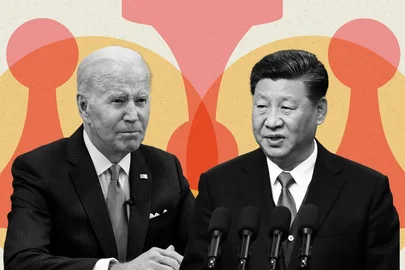

Despite Pelosi’s controversial visit, China and US could resolve differences over Taiwan
<p>
China&rsquo;s announcement that it was mostly decoupling the military dialogue with the United States after US House Speaker Nancy Pelosi visited Taiwan has two unvarnished messages for Washington.</p>
<p>
First, Pelosi had crossed the red-line defined by the sacred one-China principle. Her presence, despite Beijing&rsquo;s feverish protests, was seen in Beijing as a demonstration of tacit support for pro-independence forces in Taiwan. China therefore had no option but to respond to this breach of the one-China principle in a manner that would deter the US from taking similar steps supporting &nbsp;Taiwanese separatism in the future.</p>
<p>
Second, &nbsp;China does not, at least yet, want a complete breakdown of military communication with Washington. The Chinese have therefore kept open&nbsp; the channel of emergency military communication. As a result, the hotline between the two defence ministries continues to remain operational.</p>
<p>
In other words, the Chinese are signalling to the US that the window for preventing war, which could happen if the People&rsquo;s Liberation Army (PLA) was ordered to take over Taiwan by force, has not been closed.</p>
<p>
So, what are the key steps that Beijing has taken to decouple an institutionalised dialogue with the US military establishment?</p>
<p>
The first is the cancellation of talks between the Chinese and US theatre commanders. China has five theatre commands– &nbsp;Eastern, Western, Northern, Southern and Central. The idea is to fight wars in separate theatres separately. The US, on the other hand has 11 theatre commands, which have been setup to steel its &ldquo;global&rdquo; responsibilities.</p>
<p>
After &nbsp;Pelosi&rsquo;s visit, the China-US Defence Policy Coordination Talks and China-US Military Maritime Consultative Agreement dialogue have been &nbsp;cancelled. These are two working level mechanisms that have been effectively deployed to contain and defuse simmering tensions. But with the cancellation of the two, a working level dialogue between the two militaries will be blocked, opening up the possibility of rapid military escalation.</p>
<p>
However, this is not the first time that these dialogue mechanisms have been choked, except for the theatre commanders&#39; talks that began only after 2016.</p>
<p>
The Global Times, Chinese communist party bullhorn quoted Tian Shichen, founder of the Global Governance Institution and director of the International Centre for the Law of Military Operations as saying that the China-US Military Maritime Consultative mechanism was interrupted twice- first in 1999 when NATO bombed the former Chinese embassy in the Federal Republic of Yugoslavia. It was also shut down in 2001 after the China-US plane collision incident. &nbsp;</p>
<p>
Though China-US tensions are spiraling, possibly because Beijing has now accumulated significant firepower and is in a belligerent mood, the two countries, on four occasions in the past have experienced serious military tensions over Taiwan.</p>
<p>
For instance, China responded with large-scale missile launches in 1995-96, when former Taiwan island leader Lee Teng-hui visited the US.</p>
<blockquote class="twitter-tweet">
<p dir="ltr" lang="en">
.<a href="https://twitter.com/SpeakerPelosi?ref_src=twsrc%5Etfw">@SpeakerPelosi</a>&#39;s visit to Taiwan, if realized, would be a strong gesture of US support but not unprecedented. In 1997 then House speaker <a href="https://twitter.com/newtgingrich?ref_src=twsrc%5Etfw">@newtgingrich</a> visited Taiwan and met with Pres. Lee Teng-hui. But the balance of power btwn China and Taiwan have shifted decisively since. <a href="https://t.co/VcZ1UDd8rS">pic.twitter.com/VcZ1UDd8rS</a></p>
&mdash; Paul Huang (@PaulHuangReport) <a href="https://twitter.com/PaulHuangReport/status/1554131000371863553?ref_src=twsrc%5Etfw">August 1, 2022</a></blockquote>
<script async src="https://platform.twitter.com/widgets.js" charset="utf-8"></script><p>
The relationship was also severely strained when in October 2008, the US sold advanced weapons to Taiwan worth more than $6 billion. In 2010 again, ties plummeted after the US sold $6.4 billion worth of military hardware to Taiwan. &nbsp;</p>
<p>
<strong>Also Read:</strong> <a href="https://www.indianarrative.com/opinion-news/why-nancy-pelosi-s-visit-has-brought-china-s-annexation-of-taiwan-on-the-radar-188452.html">Why Nancy Pelosi&rsquo;s visit has brought China&rsquo;s annexation of Taiwan on the radar</a></p>
The India-UK Free Trade Agreement, signed by Prime Minister Narendra Modi and UK Prime Minister…
The Ministry of Health and Family Welfare has achieved a major milestone in women's health,…
Chief of Army Staff General Upendra Dwivedi on Saturday addressed the Kargil Vijay Diwas celebrations…
Chief of Defence Staff General Anil Chauhan on Saturday paid heartfelt tribute to the brave…
Israeli Prime Minister Benjamin Netanyahu on Friday said that Israel and the United States are…
Both Cambodia and Thailand have written to the United Nations Security Council (UNSC) following two…